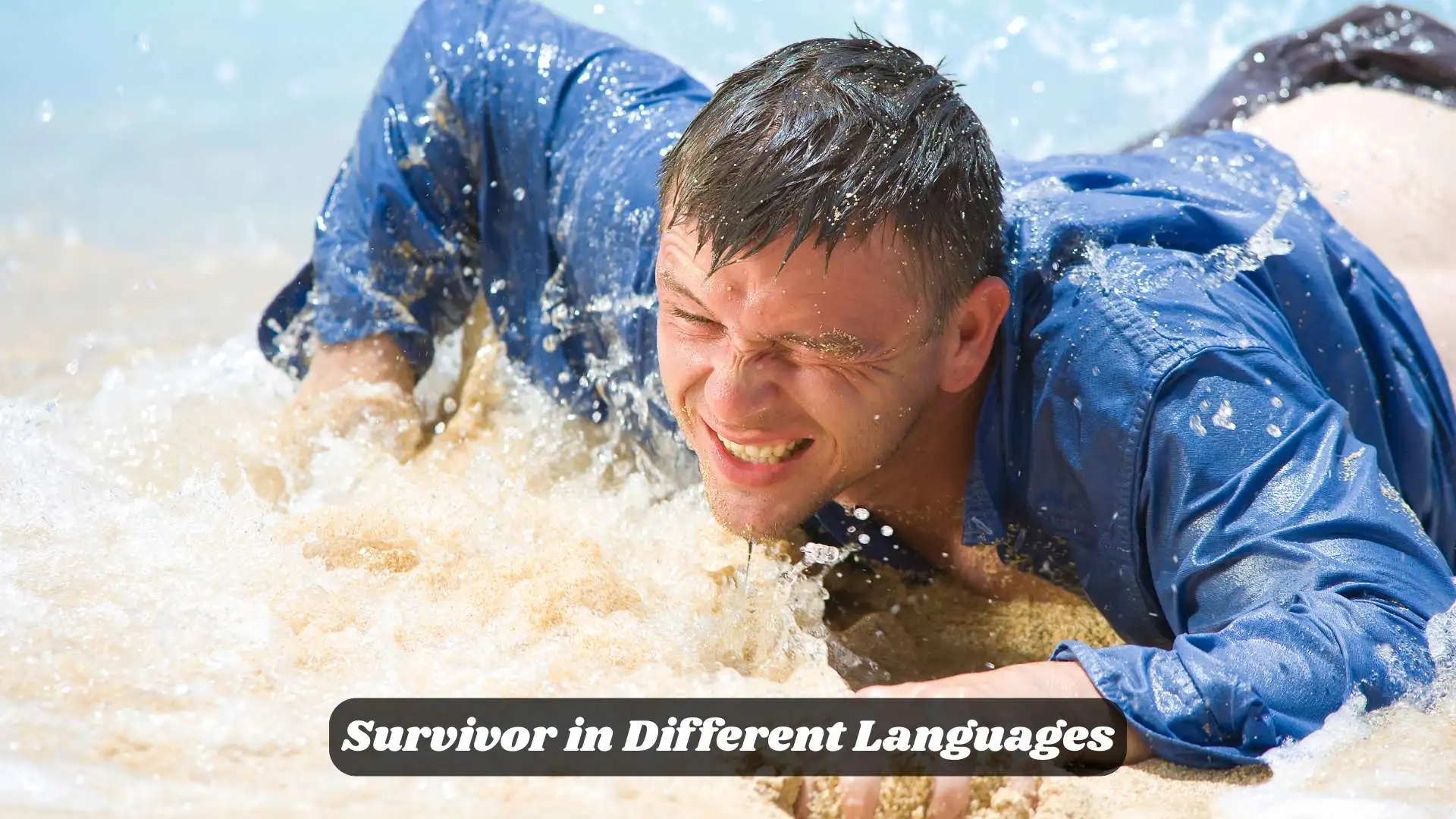People search for the word “survivor” in different languages for powerful reasons.
Whether you’re overcoming hardship, honoring someone resilient, creating a tattoo, writing lyrics, or simply curious — this word speaks of courage, endurance, and hope.
This blog will help you explore how to say survivor in 70 different languages.
You’ll not only learn how it’s written and pronounced, but also how to use it in a simple sentence — so you can confidently share it in conversation, storytelling, or creative work.
Let’s honor strength in every language on Earth.
💪 How to Say Survivor in 70 Different Languages
Each line includes:
Language Name (🇨🇳) – [Translation] | Pronunciation: [Simple English Pronunciation]
Example sentence.
- Spanish (🇪🇸) – Sobreviviente | Pronunciation: so-breh-vee-byen-teh
Ella es una sobreviviente del accidente. - French (🇫🇷) – Survivant(e) | Pronunciation: sir-vee-von(t)
Il est le seul survivant de la tempête. - German (🇩🇪) – Überlebende(r) | Pronunciation: oo-ber-leh-ben-duh
Er ist ein Überlebender des Unfalls. - Italian (🇮🇹) – Sopravvissuto/a | Pronunciation: so-prah-vees-soo-toh/ta
Lei è una sopravvissuta al disastro. - Portuguese (🇵🇹) – Sobrevivente | Pronunciation: so-breh-vee-ven-chee
Ele é um sobrevivente da guerra. - Hindi (🇮🇳) – जीवित बचा व्यक्ति | Pronunciation: jee-vit bacha vyakti
वह दुर्घटना का जीवित बचा व्यक्ति है। - Urdu (🇵🇰) – بچ جانے والا | Pronunciation: bach jaane wala
وہ ایک حادثے کا بچ جانے والا ہے۔ - Arabic (🇸🇦) – ناجٍ | Pronunciation: naa-jee
هو الناجي الوحيد من الحريق. - Turkish (🇹🇷) – Hayatta kalan | Pronunciation: ha-yat-ta ka-lan
O, kazadan hayatta kalan tek kişiydi. - Russian (🇷🇺) – Выживший | Pronunciation: vi-zhi-vshiy
Он был единственным выжившим. - Chinese – Mandarin (🇨🇳) – 幸存者 | Pronunciation: shing-tswun-zher
他是唯一的幸存者。 - Japanese (🇯🇵) – 生存者 | Pronunciation: sei-zon-sha
彼は生存者の一人です。 - Korean (🇰🇷) – 생존자 | Pronunciation: saeng-jon-ja
그는 유일한 생존자였다. - Bengali (🇧🇩) – বেঁচে থাকা ব্যক্তি | Pronunciation: ben-che tha-ka byak-ti
তিনি দুর্ঘটনার একজন বেঁচে থাকা ব্যক্তি। - Persian (🇮🇷) – بازمانده | Pronunciation: baaz-man-deh
او بازماندهٔ حادثه بود. - Pashto (🇦🇫) – ژوندي پاتې شوی | Pronunciation: zhwan-dee pa-teh shwee
هغه د برید ژوندي پاتې شوی و. - Punjabi (🇮🇳) – ਬਚਾ ਹੋਇਆ ਵਿਅਕਤੀ | Pronunciation: bacha hoya vyakti
ਉਹ ਹਾਦਸੇ ਤੋਂ ਬਚਾ ਹੋਇਆ ਵਿਅਕਤੀ ਸੀ। - Tamil (🇮🇳) – வாழ்வதற்காக போராடுபவர் | Pronunciation: vaazh-va-thar-kaaha po-raadu-pavar
அவர் ஒரு உயிர் வாழ்ந்தவர். - Telugu (🇮🇳) – బతికిన వ్యక్తి | Pronunciation: batiki-na vyakti
ఆయన ప్రమాదం నుంచి బతికిన వ్యక్తి. - Malayalam (🇮🇳) – ജീവിതത്തില് രക്ഷപ്പെട്ടവന് | Pronunciation: jeeva-tha-thil raksha-petta-van
അവന് രക്ഷപ്പെട്ട ഒരേ ഒരാളാണ്. - Kannada (🇮🇳) – ಉಳಿದವನು | Pronunciation: u-li-da-va-nu
ಅವನೊಬ್ಬನೇ ಉಳಿದವನಾಗಿದ್ದನು. - Gujarati (🇮🇳) – બચેલો વ્યક્તિ | Pronunciation: bachelo vyakti
આ અકસ્માતનો બચેલો વ્યક્તિ હતો. - Marathi (🇮🇳) – जिवंत बचलेला व्यक्ती | Pronunciation: jivant bachlela vyakti
तो एकमेव जिवंत बचलेला होता. - Nepali (🇳🇵) – बाँच्न सफल व्यक्ति | Pronunciation: baach-na safaal vyakti
उहाँ मात्र बाँच्न सफल व्यक्ति हो. - Sinhala (🇱🇰) – බේරාගත් පුද්ගලයා | Pronunciation: be-ra-gath pud-ga-la-yaa
ඔහු අනතුරෙන් බේරාගත් පුද්ගලයාය. - Thai (🇹🇭) – ผู้รอดชีวิต | Pronunciation: phoo-rôt chee-wít
เขาเป็นผู้รอดชีวิตเพียงคนเดียว. - Vietnamese (🇻🇳) – Người sống sót | Pronunciation: nguh-ee sohng sawt
Anh ấy là người sống sót duy nhất. - Indonesian (🇮🇩) – Penyintas | Pronunciation: peh-nyeen-tas
Dia adalah satu-satunya penyintas. - Malay (🇲🇾) – Mangsa yang terselamat | Pronunciation: mahng-sah yang ter-seh-lah-mat
Dia adalah mangsa yang terselamat. - Tagalog (🇵🇭) – Nakaligtas | Pronunciation: na-ka-lig-tas
Siya ang tanging nakaligtas sa sunog. - Swahili (🇰🇪) – Mtu aliyenusurika | Pronunciation: m-too ah-lee-yeh-noo-soo-ree-kah
Yeye ndiye aliyenusurika pekee. - Zulu (🇿🇦) – Owasinda | Pronunciation: oh-wah-sin-dah
Ungowasinda engozini enkulu. - Xhosa (🇿🇦) – Umphangi | Pronunciation: oom-pahn-gee
Wayengumphangi kuphithizela. - Somali (🇸🇴) – Badbaade | Pronunciation: bad-baa-deh
Waa badbaadihii keliya ee shilka. - Amharic (🇪🇹) – የተረፈ | Pronunciation: ye-te-ra-feh
እሱ ከአደጋው የተረፈ ብቻ ነው። - Hebrew (🇮🇱) – שׂוֹרֵד | Pronunciation: so-red
הוא השׂוֹרֵד היחיד מהתאונה. - Greek (🇬🇷) – Επιζών | Pronunciation: epi-zon
Είναι ο μόνος επιζών του ναυαγίου. - Polish (🇵🇱) – Ocalały | Pronunciation: oh-tsah-lah-wy
On był jedynym ocalałym. - Romanian (🇷🇴) – Supraviețuitor | Pronunciation: soo-prah-vyeh-tsoo-ee-tor
Este un supraviețuitor al tragediei. - Hungarian (🇭🇺) – Túlélő | Pronunciation: too-lay-loo
Ő az egyetlen túlélő. - Czech (🇨🇿) – Přeživší | Pronunciation: psheh-zheev-shee
Byl jediný přeživší. - Slovak (🇸🇰) – Preživší | Pronunciation: preh-zheev-shee
On bol jediný preživší. - Bulgarian (🇧🇬) – Оцелял | Pronunciation: ot-seh-lyal
Той е единственият оцелял. - Serbian (🇷🇸) – Преживели | Pronunciation: preh-zhee-veh-lee
Он је једини преживели. - Croatian (🇭🇷) – Preživjeli | Pronunciation: preh-zhee-vye-lee
On je jedini preživjeli. - Bosnian (🇧🇦) – Preživjeli | Pronunciation: preh-zhee-vye-lee
Bio je jedini preživjeli. - Albanian (🇦🇱) – I mbijetuar | Pronunciation: ee mbi-ye-too-ar
Ai është i vetmi i mbijetuar. - Icelandic (🇮🇸) – Lifandi | Pronunciation: lee-van-dee
Hann var eini lifandi maðurinn. - Finnish (🇫🇮) – Selviytyjä | Pronunciation: sel-vee-you-tya
Hän on ainoa selviytyjä. - Swedish (🇸🇪) – Överlevare | Pronunciation: uh-ver-leh-vah-reh
Han är den enda överlevaren. - Norwegian (🇳🇴) – Overlevende | Pronunciation: oh-ver-leh-ven-deh
Han var den eneste overlevende. - Danish (🇩🇰) – Overlevende | Pronunciation: oh-ver-leh-ven-deh
Han var den eneste overlevende. - Dutch (🇳🇱) – Overlevende | Pronunciation: oh-ver-lay-ven-duh
Hij is de enige overlevende. - Afrikaans (🇿🇦) – Oorlewende | Pronunciation: oor-leh-ven-deh
Hy is die enigste oorlewende. - Esperanto (🌍) – Postvivanto | Pronunciation: post-vee-van-to
Ŝi estas postvivanto de la akcidento. - Haitian Creole (🇭🇹) – Sivivan | Pronunciation: see-vee-van
Li se sèl sivivan aksidan an. - Yoruba (🇳🇬) – Akọkọ ayé | Pronunciation: ah-koh-koh ah-yeh
Ó jẹ́ ẹni tó yè kúrò nínú ìjà. - Igbo (🇳🇬) – Onye gbapụtara ndụ | Pronunciation: on-yeh gba-pu-ta-ra ndu
Ọ bụ naanị onye gbapụtara ndụ. - Hausa (🇳🇬) – Wanda ya tsira | Pronunciation: wan-da ya tsi-ra
Shi ne kadai wanda ya tsira. - Maori (🇳🇿) – Ka ora | Pronunciation: kah oh-rah
Ko ia anake te ka ora. - Samoan (🇼🇸) – Sosola ola | Pronunciation: so-so-la oh-la
O ia o le sosola ola na’o ia. - Tongan (🇹🇴) – Mo’ui fakalotolahi | Pronunciation: mo-oo-ee fah-kah-loh-toh-lah-hee
Ko e tokotaha mo’ui fakalotolahi pē ia. - Mongolian (🇲🇳) – Амьд үлдсэн хүн | Pronunciation: am-d uld-sen khun
Тэр ослоос амьд үлдсэн хүн юм. - Lao (🇱🇦) – ຜູ້ຮອດຊີວິດ | Pronunciation: phoo-hot chee-wit
ລາວແມ່ນຜູ້ຮອດຊີວິດຄົນດຽວ. - Khmer (🇰🇭) – អ្នករស់រានមានជីវិត | Pronunciation: neak roh-rien mean chee-vit
គាត់ជាអ្នករស់រានមានជីវិតម្នាក់។ - Burmese (🇲🇲) – အသက်ရှင်ကျန်ရစ်သူ | Pronunciation: a-thek-shin-kyan-yit-thu
သူကပဲ အသက်ရှင်ကျန်ရစ်သူတစ်ယောက်ပါ။ - Tajik (🇹🇯) – Зиндамонда | Pronunciation: zin-da-mon-da
Ӯ ягона зиндамонда буд. - Uzbek (🇺🇿) – Omonda qolgan | Pronunciation: o-mon-da qol-gan
U halokatdan omonda qolgan yagona odam edi. - Kazakh (🇰🇿) – Тірі қалған | Pronunciation: ti-ri qal-gan
Ол апаттан тірі қалған. - Georgian (🇬🇪) – გადარჩენილი | Pronunciation: ga-da-rich-e-ni-leh
ის ერთადერთი გადარჩენილია.
💫 Conclusion
No matter the language, survivor is a word that reminds us of strength, courage, and the will to live.

James Parker is a passionate and insightful American author known for his unique ability to connect complex ideas with everyday experiences. With a background in creative writing and over a decade of experience in the literary world, James has dedicated his career to inspiring readers through thoughtful storytelling and practical wisdom.
His writing style is modern, engaging, and deeply reflective, often focusing on personal growth, human relationships, and the subtle beauty of life’s challenges. James Parker’s work is highly respected for its authenticity and relevance, making him a favorite among readers seeking both knowledge and emotional connection.
Over the years, James has authored several impactful books, including “The Path Within”, “Finding Clarity”, and “Bridges of Thought”, which continue to resonate with audiences around the world.

